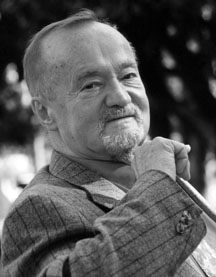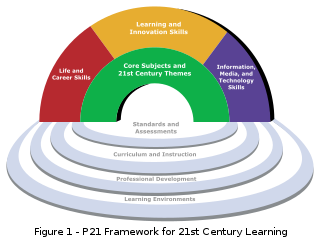Science education is the teaching and learning of science to school children, college students, or adults within the general public. The field of science education includes work in science content, science process, some social science, and some teaching pedagogy. The standards for science education provide expectations for the development of understanding for students through the entire course of their K-12 education and beyond. The traditional subjects included in the standards are physical, life, earth, space, and human sciences.
Social constructivism is a sociological theory of knowledge according to which human development is socially situated, and knowledge is constructed through interaction with others. Like social constructionism, social constructivism states that people work together to actively construct artifacts. While social constructivism focuses on the artifacts (constructs) that are created through social interactions, social constructionism focuses on social constructions as active processes, rather than outcomes.
Media literacy is an expanded conceptualization of literacy that includes the ability to access and analyze media messages as well as create, reflect and take action, using the power of information and communication to make a difference in the world. Media literacy is not restricted to one medium and is understood as a set of competencies that are essential for work, life, and citizenship. Media literacy education is the process used to advance media literacy competencies, and it is intended to promote awareness of media influence and create an active stance towards both consuming and creating media. Media literacy education is part of the curriculum in the United States and some European Union countries, and an interdisciplinary global community of media scholars and educators engages in knowledge and scholarly and professional journals and national membership associations.
Instructional scaffolding is the support given to a student by an instructor throughout the learning process. This support is specifically tailored to each student; this instructional approach allows students to experience student-centered learning, which tends to facilitate more efficient learning than teacher-centered learning. This learning process promotes a deeper level of learning than many other common teaching strategies.
Critical thinking is the analysis of available facts, evidence, observations, and arguments in order to form a judgement by the application of rational, skeptical, and unbiased analyses and evaluation. The application of critical thinking includes self-directed, self-disciplined, self-monitored, and self-corrective habits of the mind, thus a critical thinker is a person who practices the skills of critical thinking or has been trained and educated in its disciplines. Richard W. Paul said that the mind of a critical thinker engages the person's intellectual abilities and personality traits. Critical thinking presupposes assent to rigorous standards of excellence and mindful command of their use in effective communication and problem solving, and a commitment to overcome egocentrism and sociocentrism.

Argumentation theory is the interdisciplinary study of how conclusions can be supported or undermined by premises through logical reasoning. With historical origins in logic, dialectic, and rhetoric, argumentation theory includes the arts and sciences of civil debate, dialogue, conversation, and persuasion. It studies rules of inference, logic, and procedural rules in both artificial and real-world settings.

Academic writing or scholarly writing is nonfiction writing produced as part of academic work in accordance with the standards and disciplines of each academic subject, including:

Stephen Edelston Toulmin was a British philosopher, author, and educator. Influenced by Ludwig Wittgenstein, Toulmin devoted his works to the analysis of moral reasoning. Throughout his writings, he sought to develop practical arguments which can be used effectively in evaluating the ethics behind moral issues. His works were later found useful in the field of rhetoric for analyzing rhetorical arguments. The Toulmin model of argumentation, a diagram containing six interrelated components used for analyzing arguments, and published in his 1958 book The Uses of Argument, was considered his most influential work, particularly in the field of rhetoric and communication, and in computer science.
Evolutionary ethics is a field of inquiry that explores how evolutionary theory might bear on our understanding of ethics or morality. The range of issues investigated by evolutionary ethics is quite broad. Supporters of evolutionary ethics have claimed that it has important implications in the fields of descriptive ethics, normative ethics, and metaethics.

Rhetoric of science is a body of scholarly literature exploring the notion that the practice of science is a rhetorical activity. It emerged after a number of similarly oriented topics of research and discussion during the late 20th century, including the sociology of scientific knowledge, history of science, and philosophy of science, but it is practiced most typically by rhetoricians in academic departments of English, speech, and communication.
Science, technology, society and environment (STSE) education, originates from the science technology and society (STS) movement in science education. This is an outlook on science education that emphasizes the teaching of scientific and technological developments in their cultural, economic, social and political contexts. In this view of science education, students are encouraged to engage in issues pertaining to the impact of science on everyday life and make responsible decisions about how to address such issues
Quest Atlantis (QA) was a 3D multiuser, computer graphics learning environment that utilized a narrative programming toolkit to immerse children, ages 9–16, in meaningful inquiry tasks. Quest Atlantis combined strategies used in the commercial gaming environment with lessons from educational research on learning and motivation. The project was unique in its goals to combine the best aspects of learning, playing, and helping, as a means to motivate and engage students. It allowed users to travel to virtual places to perform educational activities, talk with other users and mentors, and build virtual personae. The project was intended to engage children ages 9–16 in a form of transformational play comprising both online and off-line learning activities, with a storyline inspiring a disposition towards social action. More than sugar-coating content to coerce dis-empowered students into caring about disciplinary knowledge, the goal of Quest Atlantis was to establish educational worlds where children become empowered scientists, doctors, reporters, and mathematicians who have to understand disciplinary content to accomplish desired ends.

Scientific misconceptions are commonly held beliefs about science that have no basis in actual scientific fact. Scientific misconceptions can also refer to preconceived notions based on religious and/or cultural influences. Many scientific misconceptions occur because of faulty teaching styles and the sometimes distancing nature of true scientific texts. Because students' prior knowledge and misconceptions are important factors for learning science, science teachers should be able to identify and address these conceptions.
Scientific literacy or science literacy encompasses written, numerical, and digital literacy as they pertain to understanding science, its methodology, observations, and theories. Scientific literacy is chiefly concerned with an understanding of the scientific method, units and methods of measurement, empiricism and understanding of statistics in particular correlations and qualitative versus quantitative observations and aggregate statistics, as well as a basic understanding of core scientific fields, such as physics, chemistry, biology, ecology, geology and computation.
Values education is the process by which people give moral values to each other. According to Powney et al. It can be an activity that can take place in any human organisation. During which people are assisted by others, who may be older, in a condition experienced to make explicit our ethics in order to assess the effectiveness of these values and associated behaviour for their own and others' long term well-being, and to reflect on and acquire other values and behaviour which they recognise as being more effective for long term well-being of self and others. There is a difference between literacy and education.
Donna Alvermann is an American educator and researcher in the field of Language and Literacy Education whose work focuses on adolescent literacy in and out of school, inclusive of new media and digital literacies. Her most recent research interest involves developing historical-autobiographical methods for uncovering silences in scholarly writing that mask more than they disclose. She is the Omer Clyde and Elizabeth Parr Aderhold Professor in Education in the Mary Frances Early College of Education at the University of Georgia (UGA). She is also a UGA-appointed Distinguished Research Professor in the Department of Language and Literacy Education.
An argument from authority, also called an appeal to authority, or argumentum ad verecundiam, is a form of argument in which the opinion of an influential figure is used as evidence to support an argument.

The rhetoric of health and medicine is an academic discipline concerning language and symbols in health and medicine. Rhetoric most commonly refers to the persuasive element in human interactions and is often best studied in the specific situations in which it occurs. As a subfield of rhetoric, medical rhetoric specifically analyzes and evaluates the structure, delivery, and intention of communications messages in medicine- and health-related contexts. Primary topics of focus includes patient-physician communication, health literacy, language that constructs disease knowledge, and pharmaceutical advertising. The general research areas are described below. Medical rhetoric is a more focused subfield of the rhetoric of science.

21st century skills comprise skills, abilities, and learning dispositions that have been identified as being required for success in 21st century society and workplaces by educators, business leaders, academics, and governmental agencies. This is part of a growing international movement focusing on the skills required for students to master in preparation for success in a rapidly changing, digital society. Many of these skills are also associated with deeper learning, which is based on mastering skills such as analytic reasoning, complex problem solving, and teamwork. These skills differ from traditional academic skills in that they are not primarily content knowledge-based.
Mary J. Schleppegrell is an applied linguist and Professor of Education at the University of Michigan. Her research and praxis are based on the principles of Systemic Functional Linguistics (SFL), a theory derived from the work of social semiotic linguist Michael Halliday. Schleppegrell is known for the SFL-based literacy practices she has continuously helped to develop for multilingual and English language learners throughout her decades long career, which she began as an educational specialist before transitioning to the field of applied linguistics. As a result, her publications demonstrate a deep understanding of both the theories and practices related to teaching and learning.





